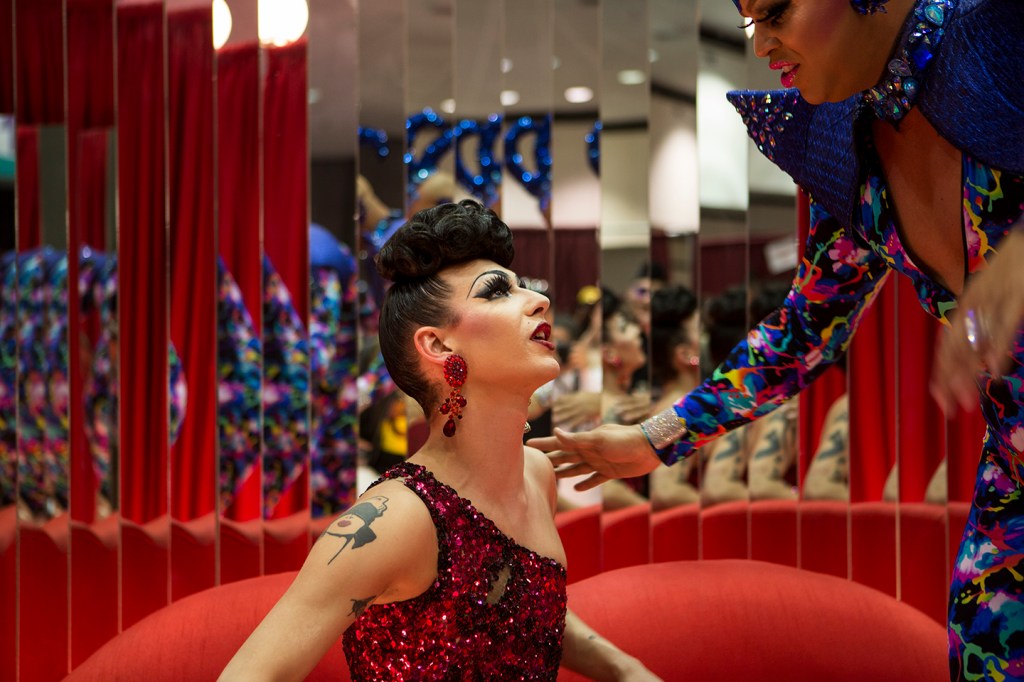
Screenshot from ‘Endless.’ Courtesy of Apple Music
For almost three weeks, Frank Ocean has been building something. Whether that physical structure is a set of stairs (to escape from the world’s incessant nagging of fans expecting an album) or a musical note, no one knows, but the audio at least has come in the form of a 45-minute, 18-track film titled Endless. Numbers like “At Your Best” put Ocean’s vocal abilities to the test via Isley Brothers’ words, while elsewhere “Comme Des Garcons” uses brand names to talk about emotions. In an interlude titled “Ambience 001: In a Certain Way,” though, the musician and Calvin Klein model turns to a black gay icon for assistance.
The 12-second track, “Ambience 001,” recalls, in mood, an interlude in Channel Orange, where a mother rips on her son. In that skit, titled “Not Just Money,” the unnamed mother etches out the difference between having money and happiness. In “Ambience 001,” Crystal LaBeija’s voice rings out clear: “Because you’re beautiful and you’re young; you deserve to have the best in life,” she says. The line is pulled from a 1968 niche documentary titled The Queen, which tracks the production and staging of a Miss All-American Camp Beauty Pageant drag contest. In it, LaBeija faces off against a range of other contestants, all brought together by the organizer Miss “Flawless” Sabrina.
Videos by VICE
The documentary is quite dull to most. The only memorable scene occurs when LaBeija is crowned third runner-up, losing out to Rachel Harlow from Philadelphia, who is Sabrina’s supposed protégé. LaBeija accuses the entire production of being rigged and walks off stage during the awards ceremony in protest. Once she’s backstage, she delivers a blistering read. “This is why all the true beauties didn’t come,” LaBeija says of the rigging. “They told me Sabrina that you had it fixed for Harlow. Everyone knew that you had it fixed for Harlow for weeks and weeks.” It’s from that scene—which comes full of zingers like, “Take a picture of me and Harlow and see which one is more beautiful, darling”—that Ocean pulled his line. But Crystal is known for more than just a catty appearance in a documentary.
In the more popular 1990 ballroom documentary Paris Is Burning, Pepper LaBeija introduces herself a full decade after Crystal’s film debut: “I am Pepper LaBeija, legendary mother of the House of LaBeija,” she says before clarifying: “Not the founder! That was Crystal, I just rule it now.” The distinction is important. The house Crystal founded is arguably the start of modern-ballroom culture, largely credited as being the start of “house” culture. It still exists today with her legendary children like Kia LaBeija in the mix.
Prior to the late 60s, “ballroom culture” revolved around drag pageants that were more like fashion shows or beauty pageants than what we come to know a ball as today. These events went back as far as the 1920s and included actual ballroom dancing. Drag queens of color weren’t often involved—their color was expected to be lightened when they were—and rarely won prizes. Even when they did, they were almost always robbed of what many believed they deserved, as with Crystal in The Queen. Out of this, black queens in Harlem began hosting their own balls. One of the first events for queens of color was thrown by Marcel Christian in 1962. But as those productions gained tractions, the participants’ looks grew more outlandish, and the audience of spectators swelled. Eventually this would lead a shift to the style of shows reflected in Paris Is Burning.
The move is a side-eye at any criticism about Ocean not “pulling his weight” for the LGBTQ community of color.
Crystal made her indelible mark in the 1970s when she, in a bit of a public-relations move, hosted a ball by the “House of LaBeija.” Put on with the assistance of Lottie LaBeija, that ball at Up the Downstairs Case in lower Harlem, was the first of its kind. The concept stuck almost immediately. LGBTQ youth began to align themselves with houses like LaBeija’s, taking on the house name as their own in a show of allegiance as Lottie had done with Crystal though they weren’t related by blood. Before long all of the balls were being put on by houses, effectively changing the entire ballroom scene. Quite a few of those houses got facetime in Paris Is Burning: House of Corey after Dorian Corey, House of Xtravaganza after Angie Xtravaganza, House of Ninja after Willi Ninja, and House of Pendavis after Avis Pendavis. These houses were not just “teams” for competition, they were familial support systems for those displaced after coming out.
Frank Ocean’s sampling of Crystal LaBeija says a lot. Sure, one could read into it for a messy subtext that could align with Crystal’s full statement at the time—after saying “you deserve the best and life,” she quips, “but you didn’t deserve this.” But to use such a specific clip nods to a recognition of his queer identity. LGBTQ visibility has long been linked to drag culture with their outsized presence in the Stonewall riots, but here Frank is aligning himself more specifically with ballroom culture, a source of pride, and for most unity amongst LGBTQ youth of color specifically.
The move is a side-eye at any criticism about Ocean not “pulling his weight” for the LGBTQ community of color. With “Ambience,” he pays direct homage to a figure integral to the nightlife culture of the LGBTQ community of color of which he is and has always been a part.
Follow Mikelle Street on Twitter.

